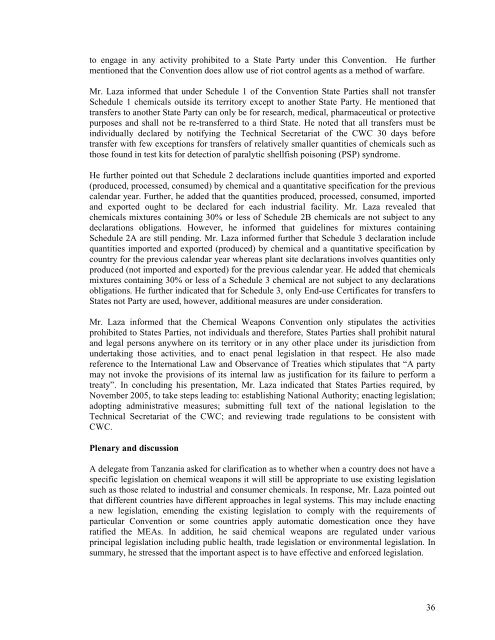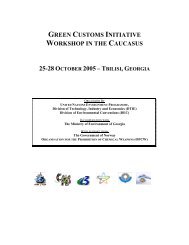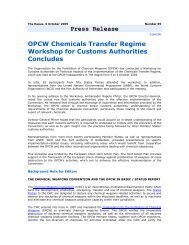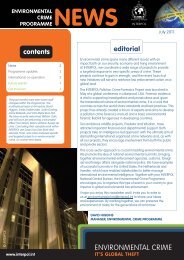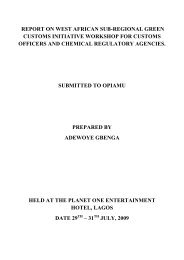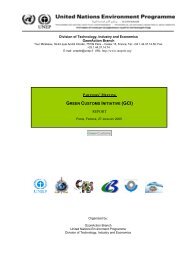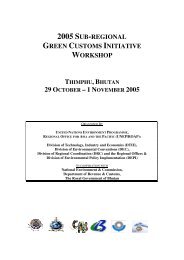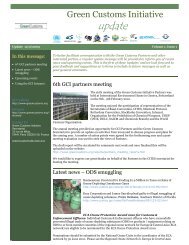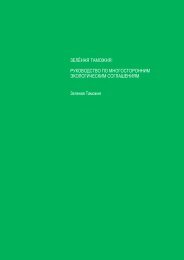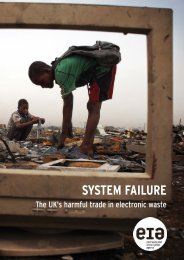Arusha - Green Customs Initiative
Arusha - Green Customs Initiative
Arusha - Green Customs Initiative
Create successful ePaper yourself
Turn your PDF publications into a flip-book with our unique Google optimized e-Paper software.
to engage in any activity prohibited to a State Party under this Convention. He further<br />
mentioned that the Convention does allow use of riot control agents as a method of warfare.<br />
Mr. Laza informed that under Schedule 1 of the Convention State Parties shall not transfer<br />
Schedule 1 chemicals outside its territory except to another State Party. He mentioned that<br />
transfers to another State Party can only be for research, medical, pharmaceutical or protective<br />
purposes and shall not be re-transferred to a third State. He noted that all transfers must be<br />
individually declared by notifying the Technical Secretariat of the CWC 30 days before<br />
transfer with few exceptions for transfers of relatively smaller quantities of chemicals such as<br />
those found in test kits for detection of paralytic shellfish poisoning (PSP) syndrome.<br />
He further pointed out that Schedule 2 declarations include quantities imported and exported<br />
(produced, processed, consumed) by chemical and a quantitative specification for the previous<br />
calendar year. Further, he added that the quantities produced, processed, consumed, imported<br />
and exported ought to be declared for each industrial facility. Mr. Laza revealed that<br />
chemicals mixtures containing 30% or less of Schedule 2B chemicals are not subject to any<br />
declarations obligations. However, he informed that guidelines for mixtures containing<br />
Schedule 2A are still pending. Mr. Laza informed further that Schedule 3 declaration include<br />
quantities imported and exported (produced) by chemical and a quantitative specification by<br />
country for the previous calendar year whereas plant site declarations involves quantities only<br />
produced (not imported and exported) for the previous calendar year. He added that chemicals<br />
mixtures containing 30% or less of a Schedule 3 chemical are not subject to any declarations<br />
obligations. He further indicated that for Schedule 3, only End-use Certificates for transfers to<br />
States not Party are used, however, additional measures are under consideration.<br />
Mr. Laza informed that the Chemical Weapons Convention only stipulates the activities<br />
prohibited to States Parties, not individuals and therefore, States Parties shall prohibit natural<br />
and legal persons anywhere on its territory or in any other place under its jurisdiction from<br />
undertaking those activities, and to enact penal legislation in that respect. He also made<br />
reference to the International Law and Observance of Treaties which stipulates that “A party<br />
may not invoke the provisions of its internal law as justification for its failure to perform a<br />
treaty”. In concluding his presentation, Mr. Laza indicated that States Parties required, by<br />
November 2005, to take steps leading to: establishing National Authority; enacting legislation;<br />
adopting administrative measures; submitting full text of the national legislation to the<br />
Technical Secretariat of the CWC; and reviewing trade regulations to be consistent with<br />
CWC.<br />
Plenary and discussion<br />
A delegate from Tanzania asked for clarification as to whether when a country does not have a<br />
specific legislation on chemical weapons it will still be appropriate to use existing legislation<br />
such as those related to industrial and consumer chemicals. In response, Mr. Laza pointed out<br />
that different countries have different approaches in legal systems. This may include enacting<br />
a new legislation, emending the existing legislation to comply with the requirements of<br />
particular Convention or some countries apply automatic domestication once they have<br />
ratified the MEAs. In addition, he said chemical weapons are regulated under various<br />
principal legislation including public health, trade legislation or environmental legislation. In<br />
summary, he stressed that the important aspect is to have effective and enforced legislation.<br />
36


